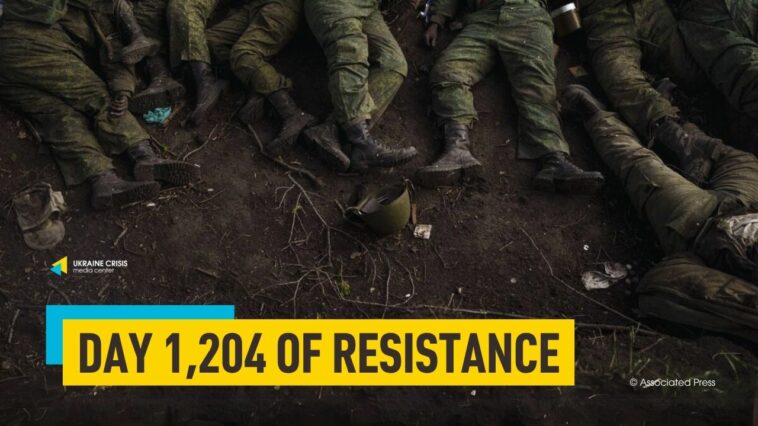A Russian drone attack on Kharkiv kills three and injures 60 others, including three children. ISW breaks down Putin’s statements to the Russian Security Council on the use of military-patriotic youth programs. Russia’s losses in war nearing one million.
Russian drone attack on Kharkiv kills three, injures 60 others, including three children
A Russian drone attack on Kharkiv overnight on Wednesday killed three people and injured at least 60 others, including nine children. The strikes caused widespread destruction in the city’s Slobidskyi and Osnovyanskyi districts, hitting apartment buildings, playgrounds, industrial sites and public transport.
Russian forces launched 17 Shahed drones at Kharkiv in a span of nine minutes, city mayor Ihor Terekhov said in a message posted to Telegram.
“Multi-story buildings, private homes, playgrounds, industrial sites and public transport took a direct hit. Apartments are burning, roofs are destroyed, cars are burnt, windows are broken,” Terekhov said. The strike also damaged trolleybuses, electricity lines powering public transportation, utilities and industrial sites, he added.
Russia launched a total of 85 Shahed and decoy drones at Ukraine overnight on Wednesday. It also fired an Iskander-M ballistic missile from the Kursk region, the Ukrainian Air Force said.
The drones were launched from the area of Russia’s Kursk, Oryol, Millerovo and Primorsko-Akhtarsk as well as from Cape Chauda and Hvardiyske in occupied Crimea. The air strike primarily targeted the regions of Kharkiv, Donetsk and Odesa.
Ukraine’s military said it had shot down 49 drones in the country’s eastern, southern, northern and central parts. Nine more drones disappeared off radar after likely being disabled by electronic warfare systems.
The drones hit target in 14 locations, with drone debris falling in two other locations, the Air Force said.
The Air Force and other branches of the Ukrainian military deployed aircraft, surface-to-air missile troops, electronic warfare and drone units as well as mobile teams to repel the attack.
ISW breaks down Putin’s statements on use of military-patriotic youth programs
Putin held a meeting with the Security Council on June 10 that largely focused on the unification of the peoples of Russia and the use of military-patriotic youth programs and Russian government initiatives to promote Russian patriotism. The Institute for the Study of War (ISW) breaks down his statements at the meeting. The paragraphs below are quoted from ISW’s report of June 10.
Putin highlighted the work of the “Movement of the First,” a Russian youth movement aimed at promoting military-patriotic education in Russia and occupied Ukraine, and “Yunarmiya” (“The Youth Army”), a movement that is responsible for instilling pro-war sentiments in Russian children and teenagers. Putin also highlighted the Russian state-mandated weekly lessons in schools that often include lectures by soldiers from the war in Ukraine.
Putin appears committed, however, to promoting anti-Western and pro-war sentiments, especially in Russian youth, likely as part of efforts to prepare Russian society for a protracted war in Ukraine and possible future conflict with NATO.
Putin recently began forwarding an unofficial ideology formulated on Russian nationalism that positions Russia in opposition to the West, which marked a notable departure from Putin’s usual rhetoric promoting the multiethnic and multireligious makeup of Russia’s population.
Putin stated that Russia must respond to challenges that promote interethnic and interreligious conflict in Russia and highlighted the “unity of the peoples of Russia.”
Putin’s June 10 statements about harmony and unity in Russia indicate that he likely remains hesitant to fully commit to a nationalist ideology centered around ethnic Russians, as this risks fragmenting Russia’s multiethnic population.
ISW continues to assess that Putin must work to balance appeasing the influential xenophobic and ultranationalist community, which is a key constituency for Putin, with the need to leverage migrants to offset immediate economic and force generation challenges and long-term demographic decline.
Russia’s losses in war nearing one million
Since Russia began its full-scale invasion of Ukraine, 999,200 of its troops have been killed or wounded, the General Staff of the Armed Forces of Ukraine said in an update on Wednesday. Russia lost 1,120 soldiers in the past day alone.
During the full-scale phase of its war against Ukraine, Russia has lost 10,927 tanks (including eight in the past day), 22,783 armored fighting vehicles (including 15 in the past day), 29,016 artillery systems (including 34 in the past day), 1,413 multiple launch rocket systems (including one in the past day), 40,297 drones of the operational tactical level (including 240 in the past day), 3,337 cruise missiles (including seven in the past day), 51,579 vehicles and fuel tanks (including 124 in the past day) and 3,914 pieces of special equipment (including two in the past day), the General Staff said.




